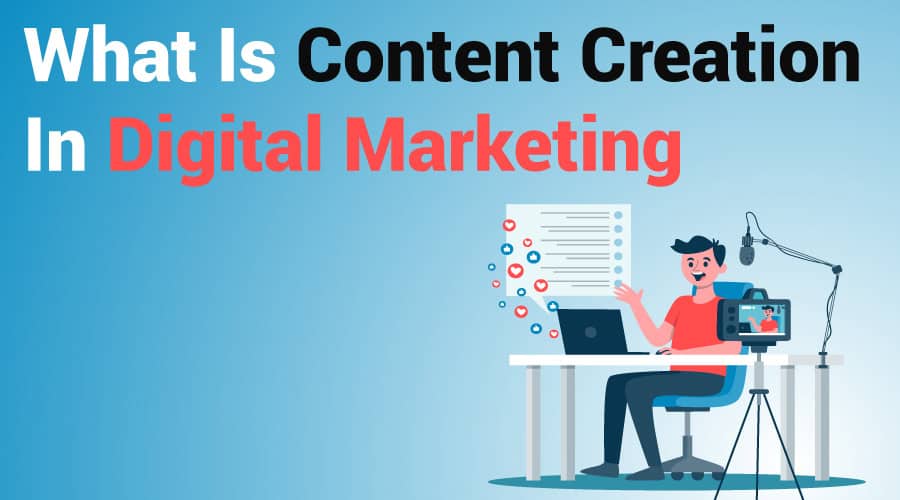
In today’s digital landscape, content creation has become an essential part of effective digital marketing strategies. But what exactly is content creation in digital marketing, and why is it so critical to the success of brands and businesses online? Content creation involves producing valuable, relevant material—such as blog posts, videos, infographics, social media updates, and more—that helps attract, engage, and retain an audience. It is the backbone of digital marketing, driving website traffic, building brand authority, and fostering customer trust.
In this article, we’ll explore content creation in digital marketing, how it serves various marketing goals and best practices for maximizing its impact. Whether new to digital marketing or looking to optimize your existing strategy, understanding content creation is crucial for building a strong, lasting online presence.
What is Content Creation in Digital Marketing?
Content creation in digital marketing is the process of producing valuable and relevant content, like blog posts, videos, or social media updates, to engage your target audience. It helps attract potential customers, build brand awareness, and drive conversions by providing information that solves problems or meets their needs.
An Overview of Content Creation in Digital Marketing
Content creation is a strategic process in digital marketing, where brands produce various types of content to engage their target audience. At its core, content creation involves developing information or entertainment that offers value, aligns with a brand’s goals, and resonates with its audience. This process is key to building relationships, establishing authority, and driving sales.
Definition of Content Creation in Digital Marketing
Content creation is more than just producing random content; it is a strategic marketing process that aligns with brand goals. It is about delivering value to audiences, addressing their needs, and inspiring action.
Types of Content in Digital Marketing
Content types range from blog posts and videos to infographics, eBooks, and social media posts. Each format serves a different purpose and can be tailored to engage various audience segments effectively.
The Role of Content in Brand Awareness and Engagement
Content is essential for building brand awareness, as it allows brands to showcase their expertise, personality, and values. It also keeps audiences engaged, driving long-term loyalty and interest.
Content Creation vs. Content Marketing
While content creation focuses on producing valuable content, content marketing involves distributing and promoting that content. Together, they form a comprehensive strategy that reaches and engages audiences.
The Importance of Quality Content in SEO
Quality content is integral to SEO, improving a brand’s visibility in search engine results. Search engines favor informative, well-researched content that is relevant to the target audience.
Why is Content Creation Important in Digital Marketing?
Understanding why content creation matters is fundamental to leveraging its benefits. Here, we’ll explore the value of content in digital marketing and its impact on brands.
Builds Trust and Authority
Creating valuable content that educates and informs helps establish your brand as an authority in your industry. When audiences trust the information you provide, they’re more likely to trust your products or services.
Drives Traffic and Leads
Content creation is a primary driver of traffic to your website. When your content answers specific queries or solves problems, it ranks well on search engines, bringing organic traffic to your site.
Enhances Customer Engagement
Content that resonates with your audience increases engagement. This could be through likes, comments, or shares on social media, as well as email subscriptions or repeat visits to your site.
Supports Other Marketing Strategies
Content creation works alongside other marketing strategies, such as social media marketing, email marketing, and SEO, to amplify their effectiveness. High-quality content can be repurposed across multiple channels for maximum reach.
Improves Conversions
Engaging content helps guide potential customers through the buyer’s journey, from awareness to decision-making, ultimately leading to conversions and sales.
Types of Content Creation in Digital Marketing
Content in digital marketing comes in various forms. Each type offers unique ways to connect with audiences. Here’s a breakdown of popular content types.
- Blog Posts: Written articles that provide valuable insights or information on topics relevant to your audience.
- Videos: Visual content that explains complex ideas, showcases products, or entertains viewers.
- Infographics: Visual representations of data or concepts, making information easy to digest.
- Social Media Posts: Quick, engaging updates on platforms like Facebook, Instagram, or LinkedIn.
- eBooks and Whitepapers: Long-form content providing in-depth knowledge, often gated to collect leads.
- Podcasts: Audio content discussing industry trends, tips, and stories, engaging listeners on the go.
Each type of content serves specific marketing objectives, allowing brands to connect with their audience on various platforms and stages of the buyer’s journey.
How to Create an Effective Content Strategy in Digital Marketing?
A successful content strategy requires planning and alignment with overall marketing goals. This section outlines steps to develop an impactful strategy.
Define Clear Objectives: Determine your goal with content—driving traffic, generating leads, or building brand awareness.
Identify Your Target Audience: Understanding who your audience is, what they need, and how they consume content is vital for tailoring your approach.
Conduct Keyword Research: Keywords are essential for optimizing content for search engines. Identifying relevant keywords ensures your content reaches those searching for topics you address.
Develop a Content Calendar: A content calendar organizes your strategy and ensures consistent publishing. Plan for different content types to keep the audience engaged.
Create Quality, Value-Driven Content: Quality matters more than quantity. Produce content that addresses your audience’s needs, provides real value, and positions your brand as an industry leader.
Measure and Adjust: Use analytics to monitor the performance of your content. Track metrics such as engagement, traffic, and conversions, and adjust your strategy accordingly.
Best Practices for Content Creation in Digital Marketing
Focus on Quality Over Quantity
Producing value-rich content is more effective than churning out large amounts of low-quality material. Quality content keeps audiences engaged and coming back for more.
Incorporate SEO Tactics
SEO is key to maximizing content visibility. Use keyword research, on-page optimization, and internal linking to make your content discoverable.
Make Content Shareable
Content that resonates with readers is often shared, expanding its reach and attracting new audiences. Craft informative, engaging content, and easy to share on social media.
Include Visuals to Enhance Engagement
Images, videos, and infographics make content more engaging and visually appealing. Visuals help break up text and make content easier to digest.
Repurpose Content for Different Channels
Maximize content’s reach by repurposing it. For example, turn a blog post into an infographic, a podcast, or social media snippets. This tactic extends the life and reach of your content.
How to Measure the Success of Your Content Creation Efforts?
Understanding how your content performs is essential for ongoing improvement. Here’s a guide to measuring the effectiveness of content creation in digital marketing.
Track Traffic and Engagement
Use tools like Google Analytics to track website traffic, bounce rates, and time on the page. High engagement indicates valuable content.
Measure Conversion Rates
Look at how many conversions each piece of content generates. Conversion tracking helps determine content that influences sales and leads.
Analyze Social Media Metrics
Monitor likes, shares, comments, and click-through rates on social media. These metrics show how well your content resonates with audiences.
Assess SEO Performance
Regularly check keyword rankings and organic traffic. High-ranking content often brings consistent traffic, boosting overall visibility.
Evaluate Audience Feedback
User feedback, such as comments and reviews, provides insight into content effectiveness. Positive feedback highlights what works, while constructive criticism guides improvement.
Conclusion
Content creation is a cornerstone of digital marketing, allowing brands to engage, educate, and inspire their audiences. You can build brand authority, drive traffic, and foster customer loyalty by crafting quality content that aligns with your audience’s needs and interests. Remember, an effective content strategy is not only about quantity; it’s about creating meaningful, relevant content that resonates with readers. By focusing on strategic planning, quality, and measurement, your content creation efforts can become a powerful force in your digital marketing success.
FAQ’s
Q. Why is content creation important in digital marketing?
A. It builds brand trust, drives website traffic, increases engagement, and supports other marketing strategies, such as SEO and social media.
Q. What types of content are used in digital marketing?
A. Common types include blog posts, videos, infographics, eBooks, social media posts, and podcasts, each serving different engagement goals.
Q. How can I create an effective content strategy?
A. Define goals, understand your audience, conduct keyword research, maintain a content calendar, and regularly measure performance.
Q. What metrics should I use to measure content success?
A. Key metrics include website traffic, conversion rates, social media engagement, SEO rankings, and audience feedback.
Jessica Jones
Jessica Jones is a talented writer at J Morgan Marketing, where she excels in creating compelling and engaging content tailored to meet the unique needs of clients. With a keen understanding of digital marketing strategies, Jessica crafts narratives that not only captivate audiences but also drive brand growth. Her expertise spans across various content forms, from blog posts and articles to social media and SEO-driven copy, ensuring that every piece resonates with its intended audience and contributes to the overall marketing goals. Passionate about storytelling and innovation, Jessica is dedicated to helping brands connect with their audience through powerful and effective content.






